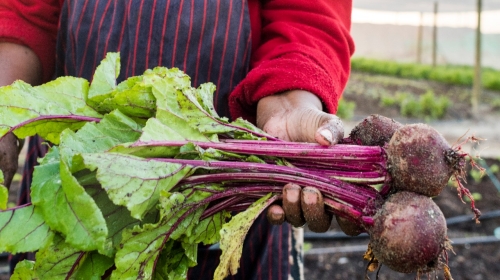COURSE - Environmental sustainability is a critical component of corporate citizenship strategy and an increasingly important business priority. This course provides an overview of concepts, tools, and resources that can get you started.
Environmental sustainability baked in

As a leading organic food company, Clif Bar integrates sustainability into its entire product life cycle. From responsible sourcing to environmentally friendly manufacturing, the company’s impressive environmental efforts are grounded in its Five Aspirations, which aim to create a healthy and sustainable food system.
“At Clif Bar, we gauge our success not on one, but on five bottom lines. We call them our Five Aspirations, and one of them is Sustaining the Planet,” said Clif Bar CEO Kevin Cleary. “The guiding principle of our Planet Aspiration is to grow a business that works in harmony with the laws of nature while working to conserve and restore our natural resources. That principle helped lead us to transition to organic ingredients beginning in 2003, to commit to operating a climate-neutral business, to build a headquarters that meets the highest green building standards, and to start the Clif Bar Family Foundation.”
One of the Foundation’s signature initiatives is Seed Matters, which seeks to feed communities around the world by increasing the availability of organic seed. In 2009, Clif Bar began supporting the initiative by pledging $1 million to help it conserve crops’ genetic diversity, protect farmers, and reinvigorate public seed research and education. The project is one of many funded by the Foundation, which also works with the Farmer Veteran Coalition, which employs returning veterans on U.S. farms; The Watershed Project, which works to protect the San Francisco Bay; and GRID Alternatives, which installs solar panels for homeowners in low-income communities.
Clif Bar’s commitment to sustainability goes beyond its philanthropic efforts, however. The company ensures that it considers the environment in every aspect of its business. From organic ingredients, to 100 percent recycled paperboard, to clean transportation, it strives to limit its impact on the planet as much as possible. Perhaps the most comprehensive example of this dedication can be found in its first company-built production bakery, located in Twins Falls, Idaho.
The 300,000-square-foot bakery was constructed in 2016 and was the first intentional use of biophilic design in a manufacturing setting—an innovative design approach that seeks to incorporate natural elements into the space. Featuring 200 windows, 570 trees, and 5,700 shrubs and grasses, the structure offers Clif bakery employees as much contact as possible with the natural, outside world. It’s how the facility manages resources, however, that is most impressive. It emits approximately 40 percent less refrigerant emissions than the average bakery through efficient refrigeration, and—by making use of hybrid cooling towers—uses a third less water. By utilizing on-demand conveyors, a waste heat recovery system, LED lighting, and a water source heat pump, the bakery consumes approximately 20 percent less energy than its peers. What electricity it does require is covered through renewable energy credits from an Idaho wind farm.
“Our design rallying cry was, ‘Think like a tree,’” said Rich Berger, vice president of engineering for Clif Bar. “Trees run on 100 percent renewable energy, recycle all waste, and sustain and improve the places they grow. That model influenced our design, and now our operation. Nature has a lot to teach us.”
Now, the Twins Falls bakery is responsible for a significant portion of Clif Bar’s product. That said, the company owns and operates a bakery in Indiana and also works closely with co-manufacturers to make up the difference. To ensure that its environmental commitments are shared across its supply chain, Clif Bar created its 50/50 by 2020 program with a goal of transitioning 50 supply chain facilities to 50 percent or more green power for the electricity used on Clif Bar’s behalf. In support, the company offers these partners—including those providing logistics, ingredients, packaging, and manufacturers—free consulting from an expert in renewable energy procurement and recognizes participating companies.
Through this initiative and others, Clif Bar is ensuring that its dedication to environmental sustainability remains a core focus point of the company—one that grows along with it.
“We’re working to run a different kind of company: The kind of place we’d want to work, that makes the kind of food we’d like to eat, and that strives for a healthier, more sustainable world—the kind of world we’d like to pass on to our children. And those aren’t just words. They’re our mission state-ment,” said Kit Crawford, co-owner of Clif Bar.
Related Content
REPORT - Survey results reveal this path to success in corporate social responsibility (CSR) and business success. Read the latest findings on how to create business AND social value.
The U.S. Fish and Wildlife Service (FWS) and the National Marine Fisheries Service (NMFS) finalized a recent set of revisions to the Endangered Species Act that were rolled back under the previous presidential administration.
The United Nations (UN) General Assembly unanimously adopted the first global resolution on artificial intelligence (AI).




